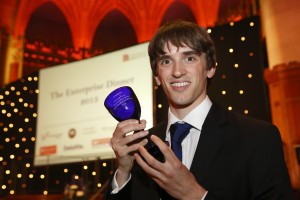Ultrahaptics, a novel technology that recreates the sensation of touch in mid-air, has won the University of Bristol’s equivalent to Dragons’ Den and a share of more than £30,000 in prize money.
Ultrahaptics, which has been developed by PhD student Tom Carter, pictured, and Professor Sriram Subramanian, beat a record 75 entries to scoop the top prize in the New Enterprise Competition, which was judged by a panel of industry experts.
The team won £15,000, plus support and business advice from the Bristol SETsquared Centre – the university’s double award-winning business incubator – for six months to help develop the technology further, explore potential uses and how it can be licensed to industry.
Ultrahaptics is based on the use of ultrasound to displace air, creating a pressure difference. By causing many waves to arrive at the same place simultaneously, a noticeable pressure difference is created at that point and can be felt by the human hand.
This sensation could be applied to a number of technologies, from computer games that involve motion-sensing and human interaction, like Kinnect, to changing the car radio with the use of a virtual button mid-air.
Tom Carter, who is studying for a PhD in computer science, said: “There’s a massive push at the moment towards touchless sensing, which would completely revolutionise how people interact with computers. In the future there could be no need for a keyboard or mouse. There are so many options to explore for how Ultrahaptics could be used and new ideas keep materialising.
“To win the New Enterprise Competition is brilliant. The funding will really help us to explore these new areas and build on the technology.”
Ultrahaptics was among finalists who submitted 20-page business plans and pitched to a panel of judges. It was announced as winner at the Enterprise Dinner in University of Bristol’s Wills Memorial Building on Tuesday.
Two runners-up were Growing People and ARM Systems, who will each receive £8,000.
Growing People is a social enterprise using derelict land and portable infrastructure to create pop-up farms to grow high-value organic produce, which will in turn be sold to support the employment of 14 to 19-year-olds from disadvantaged backgrounds. The business is the brainchild of Matt Montgomery, who is studying for an Engineering Doctorate in the Systems Centre.
ARM Systems is the work of Dr James MacFarlane and Dr Tom Scott from the Interface Analysis Centre. It uses low-cost, unmanned aerial vehicles to safely and accurately determine the distribution, identity and quantity of radionuclide (an atom with an unstable nucleus) contamination within and surrounding a nuclear site.
Modris, a spin-out company planning to produce flood risk analytics products, was awarded £1,000 worth of market research consultancy to help PhD students Christopher Sampson and Andrew Smith to refine their idea.
And UBU Lettings, a student-run letting agency established by economics student Jed Peacock, won £1,250 to help with developing his franchise idea.
This year’s competition entries were judged by a panel of industry experts from sponsoring organisations including Deloitte, EADS, IP Group, Motorola, Santander, SETsquared Business Acceleration Centre (Bristol), Veale Wasbrough Vizards and Wyvern Seed Fund.
The winners of two other awards were also announced at the dinner, with Professor Guy Orpen, Pro Vice-Chancellor for Research and Enterprise, recapping an exciting year for the University.
He described the University as an ‘agent of discovery’ with world-leading researchers who bring top students to the city, many of which stay after they graduate.
A two-dimensional flood inundation model, called LISFLOOD-FP was named the winner of the Vice-Chancellor’s Impact Award 2013. It’s served as a blueprint for the flood risk management industry.
Dr Pauline Heslop and Dr David Glowacki both won individual University of Bristol Engagement Awards, while the Know Your Bristol project won the group award.






























